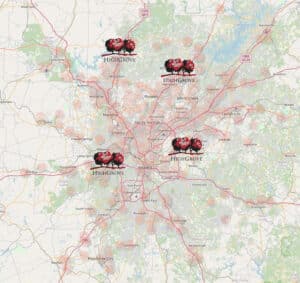Fun fact: Seattle, a city synonymous with rain, averages 37 inches of precipitation a year. But, according to the National Weather Service, Atlanta received a little more than 66 inches of rainfall in 2021, and its 30-year rainfall average is shy of 50 inches. I know that’s hard to believe, but it’s true.
Despite the interesting city comparison, when you get down to it, our city has had its fair share of struggles with  drought and water use restrictions over the years.
drought and water use restrictions over the years.
Rainwater harvesting is one time-tested way to help reduce irrigation demands from your commercial landscape. And while it’s undoubtedly a sustainable stormwater management solution, we still hear the question: “Will a rainwater harvesting system reduce our water bill?”
Let’s take a closer look at rainwater harvesting to understand how it makes eco sense and if it makes fiscal sense.
What Is Rainwater Harvesting?
As its name implies, rainwater harvesting is about capturing and storing rainwater from roofs, downspouts, and surface runoff. HVAC condensation can also be looped in with this group. This water can then be used for landscape irrigation.
Since many municipalities throughout Georgia require developments to have some form of a commercial stormwater management plan in place, rainwater harvesting is proving itself as a viable part of that plan, especially with the cost of water continuing to climb.
What Is A Cistern?
A cistern is one example of an effective rainwater collection system HighGrove has installed on commercial properties. Cisterns are large collection tanks installed on the property, either aboveground or underground.
If surface space is available on your site, an aboveground cistern might be an option for you since it doesn’t require excavation. And the fact that it’s visible shows the public how eco-minded you and your facility are.
Underground cisterns, which require excavation, are a popular option for commercial properties. Installing an underground cistern opens property managers up to a variety of tank size options as they remove space limitations from the equation. Going below ground also keeps the tank protected from harsh weather.
For either option, once the water is collected and stored, these covered tanks — with proper maintenance — do an excellent job of preventing contamination, algae, evaporation, and mosquito breeding.
10 Benefits Of A Rainwater Harvesting System
When pulling this list of rainwater harvesting benefits together, I was reminded of just how  many there are. But, of course, by installing a harvesting system as part of your commercial stormwater management plan, you’ll find the benefits go well beyond reducing water usage and saving money — but we know that’s important, too.
many there are. But, of course, by installing a harvesting system as part of your commercial stormwater management plan, you’ll find the benefits go well beyond reducing water usage and saving money — but we know that’s important, too.
You probably know that most water used on your commercial property is non-potable. By collecting rainwater, you’ll be able to irrigate your landscape with a new, cleaner source of water. Here are nine additional benefits of rainwater harvesting:
-
By collecting stormwater runoff, flooding and erosion are also reduced.
-
Rainwater is free of salt, acids, minerals, and pollutants. Salt is harmful to root growth.
-
Rainwater isn’t hard like groundwater, making it less corrosive and damaging to the system that contains and redistributes it.
-
Storage of rainwater can be used in times of drought.
-
Collecting stormwater reduces the demand on local water supply.
-
Your property will promote water consciousness to tenants, neighbors, and city hall (hopefully, it will catch on).
-
As groundwater resources decline and the cost of water increases, collecting and using rainwater is free.
-
Using harvested rainwater correctly and efficiently can help reduce your property’s water bill. It can also reduce the energy use required for water pumping and treatment.
-
A rainwater harvesting system may qualify you for tax incentives. It can also help you earn LEED certification credit for reduced water consumption.
What Are The Disadvantages Of Rainwater Harvesting Systems?
Looking back at the ten benefits I just listed, it’s hard to deny the beneficial impact rainwater reclamation can have on the environment — your property included. That said, here are four factors property managers will want to take into consideration when deciding whether or not collecting rainwater is suitable for your commercial site.
-
Initial costs, including installation, may be significant and depend on the harvesting system’s size, complexity, and if it’s going above or below ground.
-
Like solar panels, initial offsetting costs depend on cooperating weather (in this case, rainfall). However, the collection of HVAC condensation is a bit more dependable.
-
Depending on your roof type, roofing may have a coating containing harmful chemicals or a build-up of animal droppings that can contaminate clean harvested water.
-
Routine maintenance is required to ensure things are running the way they should be. If regular maintenance is not consistent, rainwater could become polluted by algae growth and pests — rodents, mosquitoes, insects.
-
Depending on the size of the collection tank installed, you may not be able to collect all the rainwater you’d like to, especially during a heavy downpour.
Could Your Commercial Property Benefit From Rainwater Collection?
Save water; save money. It can be that simple. In the end, how much money you save through rainwater reclamation all comes down to these three things: professional installation, correct use, and routine maintenance.
Are you a property manager interested in reducing water consumption? And would you like to have a plan in place that makes your irrigation needs less vulnerable to restrictions and more independent of local regulators?
If so, give HighGrove Partners a call at 678-298-0550 or use our simple contact form to set up a meeting with our stormwater management team.
Last modified: March 11, 2022




